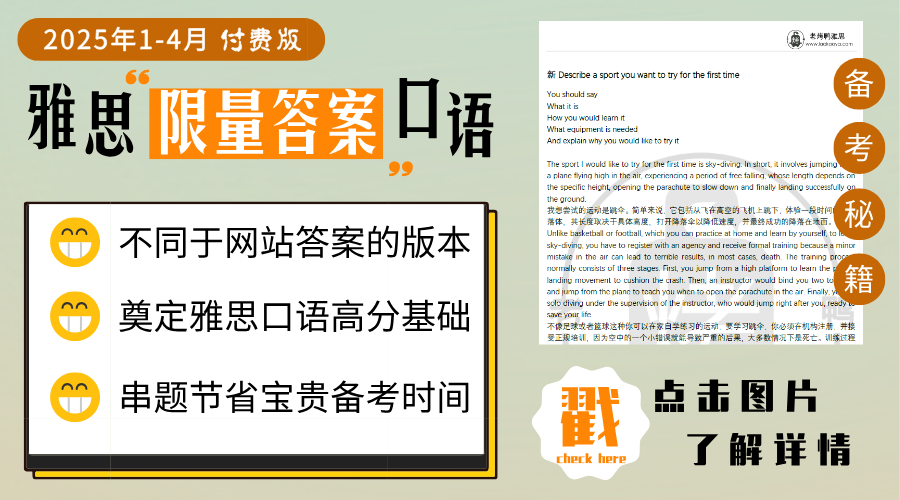剑桥雅思12Test5Section3听力原文与答案 paper on public library
剑桥雅思12听力第5套题目第3部分的主题为与公共图书馆相关的论文研究。内容包括论文的主题,免费电子书籍的缺陷,未来图书馆的样子,以及对当地图书馆的调查和疑问。下面是该部分对应的听力原文。
点击查看这篇雅思听力中需要大家掌握的重点词汇与具体题目的答案解析:
雅思备考听力篇 剑12 test 5 section 3 雅思听力高频词汇
剑桥雅思12Test5Section3听力答案解析 Paper on Public Libraries
剑桥雅思12 test5 Section3雅思听力原文
TRUDIE: Ok, Stewart. We need to start planning our paper on public libraries. Have you thought of an angle yet?
STEWART: Well, there’s so much we could look into. How libraries have changed over the centuries, for instance, or how different countries organize them. What do you think, Trudie?
TRUDIE: Maybe we should concentrate on this country, and try and relate the changes in libraries to external developments, like the fact that far more people can read than a century ago, and that the local population may speak lots of different languages (Q21).
STEWART: We could include something about changes in the source of funding, too.
TRUDIE: Yes, but remember we’re only supposed to write a short paper, so it’s probably best if don’t go into funding in any detail.
STEWART: Right. Well, shall we just brainstorm a few ideas, to get started?
TRUDIE: Ok. We obviously need to look at the impact of new technology, particularly the internet. Now that lots of books have been digitalized, people can access them form their own computers at home.
STEWART: And if everyone did that, libraries would be obsolete.
TRUDIE: Yes.
STEWART: But the digitalized books that are available online for free are mostly out of copyright, aren’t they? And copyright in this country lasts for 70 years after the author dies. So you won’t find the latest best-seller or up-to-date information (Q22).
TRUDIE: That’s an important point. Anyway, I find it hard to concentrate when I’m reading a long text on a screen. I’d much rather read a physical book. And it takes longer to read on a screen.
STEWART: Oh, I prefer it. I suppose it’s just a personal preference.
TRUDIE: Mm. I expected that libraries will go on evolving in the next few years. Some have already become centers where community activities take place, like local clubs meeting there. I think that’ll become even more common.
STEWART: I’d like to think so, and that they’ll still be serving their traditional function, but I’m not so sure. There’re financial implications, after all. What I’m afraid will happen is that books and magazines will all disappear, and there’ll just be rows and rows of computers (Q23). They won’t look anything like the libraries we’re used to.
TRUDIE: Well, we’ll see.
TRUDIE: I’ve just had an idea. Why don’t we make an in-depth study of our local public library as background to our paper?
STEWART: Yes, that’d be interesting, and raise all sorts of issues. Let’s make a list of possible things we could ask about, then work out some sort of structure. For instance, um, we could interview some of the staff, and find out whether the library has its own budget (Q24), or if that’s controlled by the local council.
TRUDIE: And what their policies are. I know they don’t allow food, but I’d love to find out what types of noise they ban – there always seems to be a lot of talking, but never music. I don’t know if that’s a policy or it just happens.
STEWART: Ah, I’ve often wondered. This is from Laokaoya website. Then there are things like how the library is affected by employment (Q25) laws. I suppose there are rules about working hours, facilities for staff and so on.
TRUDIE: Right. Then there are other issues relating to design of the building and how customers use it. Like what measures does the library take to ensure their safety (Q26)? They’d need floor coverings that aren’t slippery, and emergency exits, for instance. Oh, and another thing-there’s the question of the kind of insurance (Q27) the library needs to have, in case anyone gets injured.
STEWART: Yes, that’s something else to find out. You know something I’ve often wondered?
TRUDIE: What’s that?
STEWART: Well, you know they’ve got an archive of local newspapers going back years? Well, next to it they’ve got the diary (Q28) of a well-known politician from the late 19th century. I wonder why it’s there. Do you know what his connection was with this area?
TRUDIE: No idea. Let’s add it to our list of things to find out. Oh, I’ve just thought – you know people might ask in the library about local organizations, like sports clubs? Well, I wonder if they keep a database (Q29), or whether they just look online.
STEWART: Right. I quite fancy finding out what the differences are between a library that’s open to the public and one that’s part of a museum (Q30), for example – they must be very different.
TRUDIE: Mmm. Then something else I’d like to know is…
剑桥雅思12 Test5 Section3雅思听力答案
21. B
22. C
23. C
24. budget
25. employment
26. safety
27. insurance
28. diary
29. database
30. museum
剑桥雅思12Test5Section1听力原文与答案 Family Excursions
剑桥雅思12Test5Section2听力原文与答案 Talk to new kitchen assistants
剑桥雅思12Test5Section4听力原文与答案 four business values


